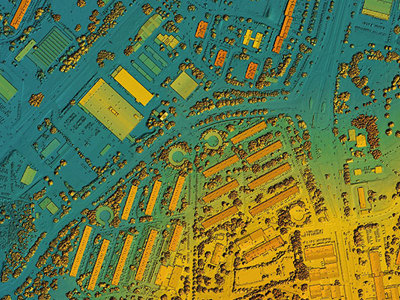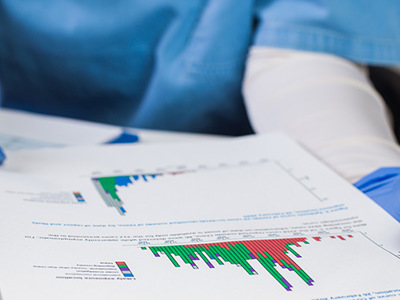
Data analytics is used to help individuals and organizations improve their performance and decision making. In these courses, you will learn to compile, manipulate and evaluate data to form effective data collections. You will gain experience with data management and modelling by documenting and presenting data into charts, tables and graphs. Your analytical skills and data visualization will reach a new level by using software applications such as Excel, Tableau and GIS, and programming languages such as Python, R and JavaScript.
Data analytics programs
We offer several programs focusing on data analytics skills that span multiple sectors.
Turn data into opportunity.
In today’s competitive job market, data literacy is more than a technical skill—it’s a professional essential. The non-credit, Certificate in Data Analytics (CDA) is designed to equip learners with practical, workplace-ready data analytics training that can be immediately applied across sectors. Focused on hands-on learning and ethical practice, this certificate provides a strong foundation in coding, visualization, data storytelling and predictive analytics.
Shape numbers into narratives.
The ability to communicate insights clearly through data storytelling is essential. The Data Storytelling and Visualization program is designed to meet the growing demand across industries for professionals who can translate complex data into actionable insights. The purpose of the micro-credential is to bridge the critical gap between data analysis and communication, using powerful tools like Microsoft Power BI.
Solve real life business problems.
We offer the Micro-certificate in Business Intelligence and Data Analytics (BIDA). This program focuses on the technical foundations and specialized skills needed to analyze patterns and trends in different data types, and to make informed decisions. The program is designed to provide you with valuable and sought-after skills in data analysis that will help you to identify opportunities and prepare you to become a specialist in this growing field, no matter the industry you work in.
Make an impact on public health.
We all want to be (and stay) healthy—we want to maintain a healthy environment, healthy people and healthy communities. The study of population health data helps us do this. There's a need for trained professionals who:
- understand the intricacies of population health data
- have the tools to accurately examine, analyze and test health data
- realize the importance of this work in both informing and advancing positive health outcomes within our society
The Micro-certificate in Population Health Data Analysis (PHDA) fills a gap in the present training needs for those working in the field of epidemiology, population health and statistical analysis. The four-course, online certificate program will give you strong foundational knowledge and data analysis skills to support your work within the health and social services sector.
Data Analytics courses
You can take up to two PHDA courses for professional development (before applying to the program).
Most courses under this topic can be taken either individually or applied towards BIDA, advanced BIDA, the Micro-certificate in Mapping with Drones, the Certificate in Business Administration or the Diploma in Business Administration. Please review the program and course prerequisites carefully.
- Advanced Data Visualization and Reporting
- Business Intelligence and Data Analytics Fundamentals
- Data Analytics Coding Fundamentals
- Data Ethics and Security
- Data Provisioning, Importing, Extracting, and Manipulation
- Data Strategy Development
- Epidemiological Statistics
- Final Project in Data Analytics and Management Science
- Health Services Program Monitoring and Evaluation
- Introduction to Data Storytelling and Visualization
- Investing for Financial Wellness
- Longitudinal Analysis and Multi-level Modelling of Population Health Data
- Machine Learning Fundamentals
- Mapping with Drones 01 Field Day
- Mapping with Drones 02 Field Day
- Mapping with Drones 1
- Mapping with Drones 2
- Population Health and Geographic Information Systems (GIS)
- Predictive Data Analytics and Modelling
- Spatial Epidemiology and Outbreak Detection
- Working with Administrative Data

Business Intelligence and Data Analytics
The Business Intelligence and Data Analytics program equips professionals with practical skills to turn complex data into strategic insights. Learn data visualization, reporting and predictive analytics to support informed decision-making. Drive business growth in today’s data-driven world.
View program

Data Analytics
Data analytics training is essential in today’s digital economy. Whether you're new to the field or building on existing experience, this program helps you develop practical data analytics skills in coding, data visualization, storytelling and ethical analysis. Advance from foundational knowledge to real-world application through flexible online courses and hands-on learning.
View program

Data Analytics for Management Science
This diploma uniquely integrates hands-on experience with real business datasets, ethical considerations in data analysis, and strategic management principles, all while providing a clear pathway to career opportunities and a network of industry connections.
View program

Data Storytelling and Visualization
Gain the practical, applied data storytelling and data visualization skills to translate complex data into clear, compelling insights to drive decision-making and bridge the gap between data analysis and communication. Prepare for future Microsoft Power BI certification or build a job-ready portfolio today.
View program

GIS Skills and Mapping
GIS technology is increasingly integrated into various industries to enhance spatial data analysis, decision-making, and planning capabilities. The program provides hands-on training in open-source software like QGIS, Google Earth and the Gaia app. You will learn to create custom maps, analyze spatial data, and answer complex human and environmental questions.
View program

LiDAR Fundamentals for Climate Change Risk Analysis
LiDAR is a remote sensing survey method that facilitates 3D mapping of the Earth’s surface including urban and rural topography. This program equips learners to use and analyze LiDAR data for developing critical information towards mitigating the impacts of climate change.
View program

Mapping with Drones
Do you want to take your connection to our planet to new heights? Flying drones gives you the chance to navigate the Earth from above and reach new perspectives like never before.
View program

Microsoft Office Bootcamp
Microsoft Office certification is essential for everyday tasks at work, school and home. Whether you're improving basic office skills or preparing for a new administrative role, this program helps you with Word certification, Excel training, PowerPoint proficiency and more—quickly move from beginner to advanced skills through online instruction and self-study.
View program

Population Health Data Analysis
The online Population Health Data Analysis program is designed for those who are seeking education and professional development in advanced population health analysis. The goal of the program is to provide participants with strong foundational knowledge and data analysis skills that can support their work within the field of population health.
View program

Discover how UVic instructor Melina Luxruel teaches data ethics, data security, and AI‑related privacy skills to help learners use data responsibly and ethically.
Read Story
Learn how an agile framework and mindset can help teams work smarter, improve collaboration, and adapt faster to change in today’s organizations.
Read Story
Learn Geographic Information Systems (GIS) skills and mapping techniques with expert instructor Jessica Neal through UVic Continuing Studies' micro-certificate program. Transform complex data into actionable insights for environmental science, urban planning, climate response, and healthcare applications. With over 10 years of GIS teaching experience, Jessica guides students through hands-on projects that build portfolio-ready skills for high-demand careers in government, environmental consulting, and spatial data science.
Read Story
Continuing Studies offers courses in epidemiology and health data analysis, such as the Epidemiological Statistics course, as part of the Population Health Data Analysis program. These courses equip students with skills to analyze health data, uncover trends, and address societal health challenges through advanced methodological tools and techniques.
Read Story
The Canadian Longitudinal Study on Aging gathers extensive health data to understand aging. Enroll in this course to learn advanced analysis skills for impactful health insights.
Read Story
You've launched your career and now it’s time to sharpen your skills. But how can you expand your work horizons without sacrificing a manageable work/life balance?
Read Story
Here is Cathy's story… Cathy is an experienced administrator who works in a social services organization. She's been involved in evaluation projects in the past but was recently asked to take the lead on a new program evaluation. Cathy confided in a colleague. "Honestly, I’m feeling really overwhelmed," she said. "With a six-month deadline looming, I know I have to plan my time wisely, and I’m not sure exactly where to start!"
Read Story
We live in a data filled world. In recent years, many of us have become increasingly aware of this fact and cautious about how our data is being protected and used. But do we really know the value of this data for improving our health and social well-being?
Read Story
In our changing world, disease incidence and environmental risk are an ever-present topic we are all aware of. It’s important to understand the association between environmental exposures and health outcomes.
Read Story
Learners within the Division of Continuing Studies at the University of Victoria continue to benefit from the department's resolute commitment to preparing people for an evolving economy and workforce. The division's latest initiative advances accreditation in micro-credentials, which are standalone short-duration, competency-based learning experiences.
Read Story
By knowing more about how loneliness is associated with health conditions and morbidity, further work can be done to address questions of concern for both patients and the practitioners who serve them.
Read Story
Data has never played a more important role in addressing health outcomes. Regardless of their background, the individuals that enroll in the PHDA program’s geospatial courses are looking to enhance their existing skillset and bring value to their current and future work.
Read Story
The fight against COVID-19 is far from over, but in tackling this global pandemic, researchers, governments, and health organizations worldwide have made huge strides in sharing knowledge and combining expertise.
Read Story
Wenti Xu completed the Professional Specialization Certificate in Population Health Data Analysis. Read about how she plans to apply her new skills in her work.
Read Story
According to the most recent report by the World Economic Forum, the top job roles demonstrating increasing demand across all industries are data analysts and data scientists.
Read Story
Frederick recently completed the Professional Specialization Certificate in Population Health Data Analysis and now works as a Project Analyst for First Nations Health Authority.
Read Story
How many times have you turned to a map to find the closest park, best restaurant or most desirable housing development? Whenever we use a map in this way, we are essentially analyzing its contents to help us make a decision.
Read Story
We recently caught up with Hiranand Chawla, a student in our Business Intelligence and Data Analytics (BIDA) program. We were interested to learn more about his experience in the program.
Read Story
Health Canada’s COVID-19 epidemiology updates provide vital information on how Canada is managing the epidemic on both a federal and provincial level.
Read Story
The ability to use GIS and epidemiology to address emerging population health issues in our society are key components of the Population Health Data Analysis (PHDA) program.
Read StoryOur society generates exponential amounts of information every day. Big data now fuels the engines of change and influence, but how can we harness this power to make meaningful social change?
Read StoryAccording to The Canadian Longitudinal Study on Aging (CLSA),“for the first time in our history the number of Canadians over 65 has exceeded the number of those aged 14 and under.
Read StoryData now fuels decision-making in almost every sector of our society. As a result, interest in data-intensive science is growing rapidly as opportunities to explore this expanding resource source abound.
Read Story
Expanding your tools and techniques to improve your practice Interested in adding more tools to your improvement toolbox? There are many ways to support the ongoing management and improvement of health services and programs.
Read Story
Seeing the big picture in the maze of complex and often messy data requires a unique set of skills. To be successful, researchers need to hone their role as ‘data detectives’ to effectively use and analyze administrative data.
Read Story
Geospatial information (GI) identifies the geographic location of natural and built objects; but when combined with other forms of data, it can provide extremely valuable information for a myriad of business, government, academic educational or consumer applications.
Read Story
Adele Balram is a Database Analyst with the New Brunswick Institute for Research, Data, and Training.
Read Story
According to a recent 2016 Health Status Report, 90 percent of Canadians indicated they have good to excellent health. That’s very promising news, especially when you consider that Canada’s average life expectancy of 82 years makes us one of the healthiest nations in the world. But before we get too comfortable, maybe we should check out the whole story.
Read Story
The Professional Specialization Certificate in Population Health Data Analysis will give you the skills and knowledge you need to get ahead in your career. Complete four courses to earn a certificate conferred by the University of Victoria or take up to two courses for professional development.
Read Story
You’ve achieved success in your academic degree and launched your career. Short term, professional specialized training offers the theory and the practice that you need to move your career goals forward.
Read Story
By Anders Erickson, Instructor Access to timely and quality health care is an important determinant of health and well-being.
Read Story
Planning a research project has many key components, from formulating a research question and reviewing available data sources to preparing and analyzing the data. Making your way successfully through this process requires the knowledge and skill to ask the right questions and apply the appropriate statistical or analytic techniques. Many individuals working in the area of population and public health, know they cannot rely on a static set of skills to support the challenges of this work.
Read Story
Have you ever wanted to evaluate a program or project but didn’t know where to start? In an era of accountability it can be overwhelming to know how best to evaluate and demonstrate the value of your work.
Read Story
I learned about the PHDA program while pursuing work at the BC Cancer Agency. It was good timing, as I wasn’t sure about my professional development plans for that year.
Read StoryTel 250-721-8944
Email bustech@uvic.ca PHDA Program Assistant
Tel 250-721-8481
Email phda@uvic.ca

